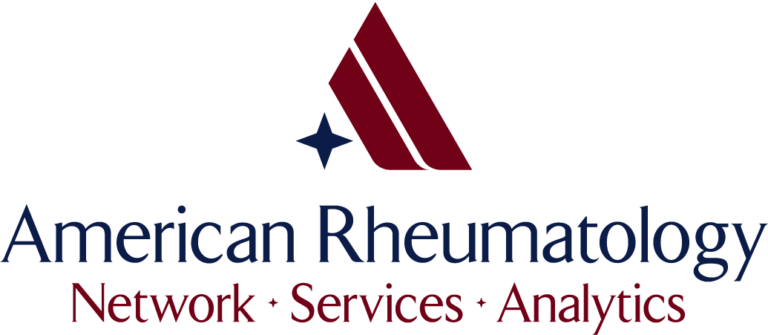
by Colin Edgerton
We are seeing COVID-19 cases peak in many areas of the US, prompting thoughts about what comes next for rheumatology practices. Many community rheumatology practices have been hit hard by the crisis, and we hope that sharing “lessons learned” will inform practices on what steps to take now, and what to anticipate soon.
Articularis Health Group (AHG) is the largest rheumatology practice in the country, with practice sites throughout the states of South Carolina, Georgia, Florida, and Tennessee. AHG’s 55 providers (41 rheumatologists and 14 APCs) practice together with clinical and financial integration. AHG also participates in a larger network of independent practices called the American Rheumatology Network (ARN)—more on the benefits of this later. The coronavirus crisis has taught AHG three important lessons:
- Maintain access to care
- Engage your staff: communicate frequently, listen to concerns, let them work
- Network in a meaningful way with other practices
Maintain Access to Care: The most important lesson AHG is learning during this crisis is just how important, indeed critical, rheumatology care is. At the initiation of the crisis, AHG committed to maintaining near normal access to new patient appointments and consults as well as minimal disruption to ongoing office treatments such as infusions. The AHG clinical care committee, composed of physician leaders at each site, implemented CDC guidelines to physically distance patients in the practices, implement PPE and cleaning protocols, and adjust scheduling to ensure protection against infection for patients and staff. Administration quickly transitioned non-essential employees to working from home, freeing up space for appropriately distanced care. These changes required a “all hands on deck” approach, including retraining of some staff to help in more critical areas. AHG has retained all staff without the need to furlough or lay off employees.
Practical details on how to implement these steps are available on our home page.
The need for patient access to rheumatology care is critical during this crisis. AHG providers are evaluating and treating a spectrum of presentations from unstable pelvic fractures to organ threatening vasculitis. We hear rheumatologists across the country describe patients with cerebral infarcts from vasculitis, crystalline arthritis patients immobilized from their disease while orthopods prescribe antibiotics, and patients on corticosteroids presenting with mental status changes and blood glucose levels over 950! During this crisis, these patients have no other place to receive the care they need. AHG closely monitors and follows ACR guidelines on infusion practices, urgent care, and clinical care as they have become available.
AHG quickly pivoted to telehealth for appropriate and generally routine established patients. A quick study of available vendors helped to select doxy.me, and spreadsheets of payer policies and reimbursement were generated.
With these change in place, access to care is maintained, staff remains fully engaged, and disruption of revenues is minimized.
Engage Your Staff:
Maintaining access to care requires staff engagement, and our staff are the unsung heroes during this crisis. Communication is critical, and we are particularly sensitive to infection control practices, emphasizing safety by protecting our staff from the “prolonged, close contact” that CDC guidelines are designed to minimize. We hold practice-wide “town halls” for each section (infusion nurses, clinical assistants, clerical workers) discussing the nature of the crisis, the impact in each local practice area, and the steps we are taking to mitigate. These forums emphasize question-and-answer sessions, informing leadership on where concerns exist. This approach calms fears, reduces absenteeism, and increases productivity.
Network in a Meaningful Way:
Following COVID-related guidelines and navigating government relief programs introduces new administrative complexities. Networking is a key solution, and AHG participates in the American Rheumatology Network (ARN), a national network of independent rheumatology practices who leverage discounts on group purchasing, share best business practices, and collaborate on value-based medicine and data analytics. ARN includes over 300 rheumatologists from both the largest single specialty practices in the US (with their significant management and specialized staff resources), to small and medium sized practices. This allows networking with counterparts in other rheumatology practices, taking advantage of the considerable legal and accounting expertise within practices, helping members take advantage of government relief programs such as the Payroll Protection Program, the HHS Emergency Fund program, and tax credits related to modified leave regulations. As a result, AHG has successfully received PPP and HHS monies and has implemented the accounting and reporting requirements required to comply with these programs. AHG cash-flow is stable despite the crisis, and we are expanding and hiring new staff! AHG anticipates no reduction to provider compensation due to the COVID crisis.
____________________________
About Articularis Healthcare Group:
Articularis Healthcare Group, Inc (AHG) is a physician led and owned organization dedicated to improving healthcare by supporting independent rheumatology practices. As the nation’s largest Rheumatology specialty group, our affiliates have access to best business practices, advisory and management services, innovative practice performance technology, and value-based treatment pathways. Please visit our website at: https://articularishealthcare.com/ for more information.
About American Rheumatology Network:
American Rheumatology Network (ARN) is a physician led and owned organization committed to improving healthcare by empowering independent rheumatology practices across the nation. Through our network physicians and practice administrators have access to best business practices, innovative practice performance technology, and value-based treatment pathways.


